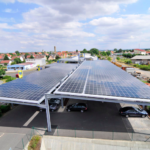
Retailers, hoteliers and local authorities are stepping up efforts to develop revenue generating electric vehicle car parks – and secure grid rights in what could be an increasingly congested system.
Solar and storage could play a key role in easing network constraints, but according to a renewable energy lawyer, a competition for feasible sites is heating up.
Nottingham City Council is working on what will be “Europe’s largest vehicle-to-grid project,” according to Luke Raddon Jackson, energy projects manager within the council’s Energy Projects Service business unit.
The project, at the council’s Eastcroft depot, which houses the incinerator that feeds its district heat network, will help power “hundreds of electric commercial vehicles that we will roll out over the next couple of years,” Jackson told The Energyst Event.
The Energy Projects Service, which develops and owns onsite generation and energy projects for the council as well as other public and private clients, is “having a big push on solar car ports” more broadly in a bid to create income for frontline services.
“We own a lot of car parks that generate a lot of revenue,” said Jackson. “Solar car parks are going to generate a whole new revenue stream and help push us even closer to breaking even as a council.”
While a “significant opportunity”, Jackson said working with DNOs to manage constraint challenges and share benefits “is absolutely key”.
The conference also heard from Rob Brown, sales & marketing director at Ecova, who said the Engie-owned consultancy is undertaking connection work for a hotel chain, deploying eight Tesla super chargers at four hotels.
The chargers, which enable a 170-mile charge in half an hour, are 250kW each. Eight chargers in each hotel therefore creates a 2MW load.
“That is a challenge in constrained areas,” said Brown. “Destination chargers [that enable rapid charging of multiple types of EV] also use a similar amount of power. That is something coming down the wire at quite a pace.”
Retailers are also eyeing EV car park infrastructure. According to Maria Connolly, head of energy and renewables at law firm TLT, there is “a bit of a land grab going on” to secure options.
Speaking at an Electricity Storage Networks conference in London, Connolly said: “We think we will see [growth] in EV-solar-storage developments. We are hearing [from clients] that it looks to be attractive, with revenue from the charging stations, plus ancillary services and generation as well.”
Meanwhile, other councils are trying to use EVs themselves – or rather second hand EV batteries – as part of the solution.
Dundee County Council plans to use second life Renault batteries from Connected Energy, alongside solar canopies, as part of the city’s charging network.
Connected Energy CEO Matthew Lumsden told The Energyst the firm was receiving “a huge volume of enquiries” around rapid charging solutions and is having “detailed conversations” with potential project partners.
“But the key is to pick the right ones.”
See the forthcoming May print issue of The Energyst for an interview with Matthew Lumsden on the potential of second life batteries to enable higher earning grid services.
Related stories:
Energy managers ‘to become fleet managers as EVs rise’
Electric vehicle boom no sweat, says National Grid
Electric vehicles ‘won’t require new power stations’, say analysts
Northern Powergrid: EVs a resource not a problem
EVs ‘could provide 11GW of flex’
National Grid focuses on bringing smaller firms and EVs into flexibility
Lord Redesdale: Idea of EVs as battery storage is ‘complete crap’
Flexitricity chief: UK has enough spare power electrify every car on the road
Greg Clark calls for automakers and energy industry to collaborate on battery storage
Tesla: People don’t engage with energy bills, but they will have to
Click here to see if you qualify for a free subscription to the print magazine, or to renew.
Follow us at @EnergystMedia. For regular bulletins, sign up for the free newsletter.




Hi. Has anyone considered business rates in this context. If you charge for electricity to obtain a return on investment would the spaces become ratable ?